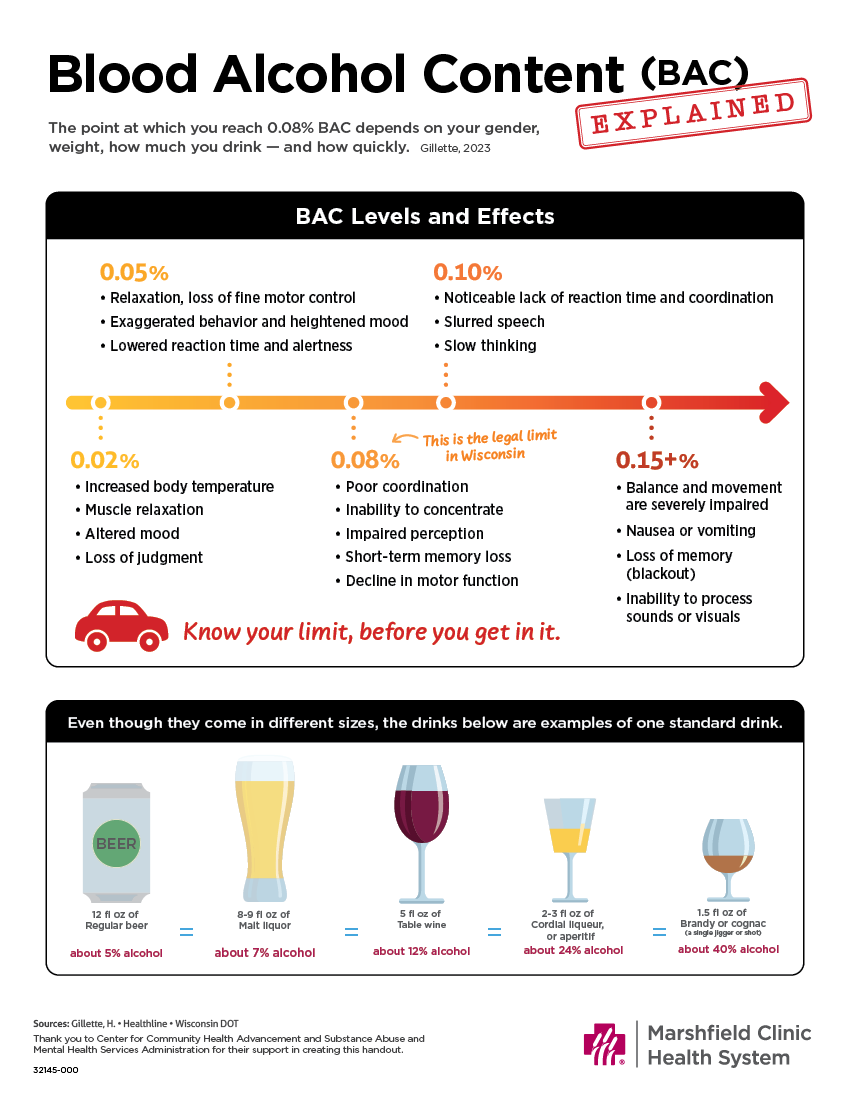How you metabolize alcohol can greatly affect your body, which is like a sponge. It soaks up whatever you consume – from fat to fruits and water to booze.

Metabolism – the body process that chemically breaks down alcohol and releases it into the blood – affects how you react to alcohol. Metabolizing alcohol can take more time than your body needs to absorb it. As a result, if you’re taking in alcohol faster than your body’s metabolism can handle, you can become drunk more quickly.
“Many factors come into play with how your body reacts to alcohol,” said Paul Thompson, M.D., family medicine physician with Marshfield Clinic Health System. “Despite the differences in those factors, in general, your body quickly absorbs alcohol into your blood. This may cause you to not realize how seriously impaired you are.”
Effects of alcohol
Factors that influence your body’s ability to metabolize alcohol include:
Your genetics
Alcohol is broken down by three enzymes – special substances that work as catalysts, sort of like starter fluid, for certain reactions in your body. Gene variations, for example, between some ethnic groups, can make these enzymes less effective at breaking down alcohol.
Your body weight
The amount of blood and water inside you affects how alcohol moves throughout your body. Lower body weight generally means less blood and water. That’s why smaller people can become impaired faster than larger people. This also partially explains why women can feel alcohol effects sooner and differently than men.
Your gender
Women have lower levels of one alcohol metabolizing enzyme. This means their bodies take longer to break down alcohol, increasing its effect on brain function and toxic exposure to other organs.
Your beverage choice
Alcohol content can vary depending on the alcoholic beverage. Because there’s more water in beer and wine than in hard liquor, alcohol effects from drinking beer and wine may be somewhat less when consumed in moderation.
Carbon dioxide bubbles in soda used in mixed drinks and in champagne actually cause alcohol to more rapidly absorb.
Your food intake
Twenty percent of alcohol is absorbed through the stomach. A full stomach can help slow alcohol absorption giving your body more time to metabolize it.
Your medications
Alcohol can make medications less effective or dangerous. Check with your doctor or pharmacist about your medication’s effectiveness and side effects before drinking alcoholic beverages.
Your health
If you’re tired or stressed, your body can more strongly react to alcohol.
Alcohol levels and effects
Regardless of all these factors mentioned, alcohol content in your blood will peak 30-45 minutes after your last drink.
“Keep this timing in mind. Designate a driver or rethink whether to do other planned activities that requires clear judgment, physical coordination and quick reflexes,” Thompson said. “Understanding alcohol’s effects can keep the good times, good.”
When you reach 0.08% blood alcohol content (BAC), you are legally too drunk to drive a vehicle in Wisconsin. However, effects start happening at 0.02% alcohol with muscle relaxation, altered mood and loss of judgment.
View this handout to learn more about the effects of blood alcohol content.

Talk to your primary care provider for more information on how alcohol can impact your body.
Schedule an appointment Message your provider
Related Shine365 articles
Have a drinking problem? Alcoholism and binge drinking






Leave a Reply